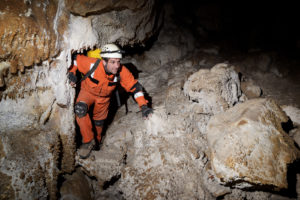
Speleology is the academic study of caves and cave systems.
What Does a Speleologist Do?
Speleology is both a niche area of geoscience and a broad area of study that looks at many aspects of caves. There is much we can learn from these curious geological formations, from how they formed to which zoological species inhabit them, to their geological profile, examining how stalagmites and stalactites form, their internal hydrology (the profile and processes of water bodies within caves). They will also be interested in caves as habitats for paleontological and anthropological remains.
Caves are often a microcosm of niche ecology, therefore those with a professional interest in the biological sciences - zoology, botany, mycology, entomology might be drawn to speleology too in examining the native plants and animal species that grow and thrive within a cave system. In recent years, researchers have found plants that can grow in very low light levels. Understanding these plants may shed light on a variety of interrelated issues such as plant genetics.
Caves are also important sources of mineral deposits. Speleologists might work to mine these resources or examine how they might have come to form there. Speleologists might also work as cartographers, developing maps for caves used for recreational or tourist use - devise the safest route through a cave, or come up with ways to ensure they are safe. They work mostly in caves but will spend their time between offices and labs and the cave systems that they study.
Where Does a Speleologist Work?
As this is a niche area, BLS does not presently hold data on speleology specifically and neither does any other professional monitoring services. However, speleology is a geoscience which means anybody with a professional interest in this area has transferable skills and a broad knowledge base for working elsewhere. According to a 2017 BLS report, the industry employing the highest number of geoscientists is architecture, engineering and related at 26%. Any speleologists who work here may be interested in designing or redesigning cave systems, for example as tourist attractions, or repairing damaged natural or artificial caves.
The second highest employer of geoscientists was mining, quarrying and oil and gas extraction at 24%. Similarly, they may work in locating caves and examining them as potential sources of minerals or fossil fuels.
Federal government employed the third highest at 7%. Speleologists who work for the government are likely to work for scientific institutes such as NOAA and EPA, carrying out tests and experiments for signs of climate change or ecological issues. The fourth highest, also at around 7%, is state government. They will work in roles similar to those of Federal government.
The fifth highest employer was in education. These are college lecturers and academic researchers.
What Is the Average Speleologist Salary?
BLS salary data highlights the average salary of geoscientists in general, but not speleology specifically. As they have similar skills and qualifications, we can expect pay and job demand to roughly equal the broad area of geoscience. As of May 2020, the BLS reported a median salary of $93,580 for geoscientists. The lowest paid 10% group were reported to earn a salary of $51,890 while the highest 10% of earners reported a salary of about $201,150. Mining and quarrying paid the highest median salary of $125,670. Second highest was the federal government at $104,120.*
Speleology Engineering Jobs & Job Description
What Is the Job Demand for Speleologists?
Job demand for all geoscientists is expected to increase some 7% between 2020 and 2030. Most work is likely to be in government roles for environmental protection and continued need for mineralogy prospecting and fossil fuel survey. There will always be demand in the education sector and with the multidisciplinary approach of speleology, these transferable and broad skills may become more useful.*
What Are the Education Requirements to Become a Speleologist?
Speleology requires the student to develop a broad set of scientific skills. High School students should ensure they develop good grades in the hard sciences (physics, chemistry and biology) and math, but geography will also be vital to further study. Your degree choices are varied, but a career in speleology will require a strong focus on the broad range of subjects. The most obvious choices for your major include geology and geography but you minors and electives should be carefully chosen to complement the major. Any cartography or survey minor should be prioritized and so should GIS where available. Biological sciences, anthropology and zoology would also be useful.
In most cases, a bachelor's degree will be more than adequate for your intended career choice as a speleologist. It's a niche area with little competition and choosing the right major and minors should be enough. However, if you want to develop a specific interest in a certain aspect of the study of caves, you should explore these options in a relevant master's degree. Environmental biology or chemistry, ecology and postgraduates degrees focused on natural resources are all sound choices, Doctoral study may be useful for those wishing to teach certain aspects of speleology in colleges and universities.
Speleology - Related Degrees
What Kind of Societies and Professional Organizations Do Speleologists Have?
As a growing and important area in the modern world, geochemistry has some important organization for employment, networking and industry information.
- National Speleological Society: Although cave explorers are now called “cavers” or “spelunkers” and “speleology” is reserved for academic study, the link between cavers and researchers has never broken. NSS brings together anyone and everyone interested in caves
- Union Internationale de Spéléologie: The world's largest global organization for the study of caves, similarly it promotes knowledge-sharing and networking between academics, researchers and recreational cavers in scientific, cultural and as an outdoor pursuit
- Cave Research Foundation: CRS is a non-profit organization originally sponsored by the NSS, today it's one of the largest cave research organizations in the country, working to conserve and learn about these important geological formations
*2020 US Bureau of Labor Statistics salary figures and job growth projections for geoscientists reflect national data not school-specific information. Conditions in your area may vary. Data accessed September 2021.





